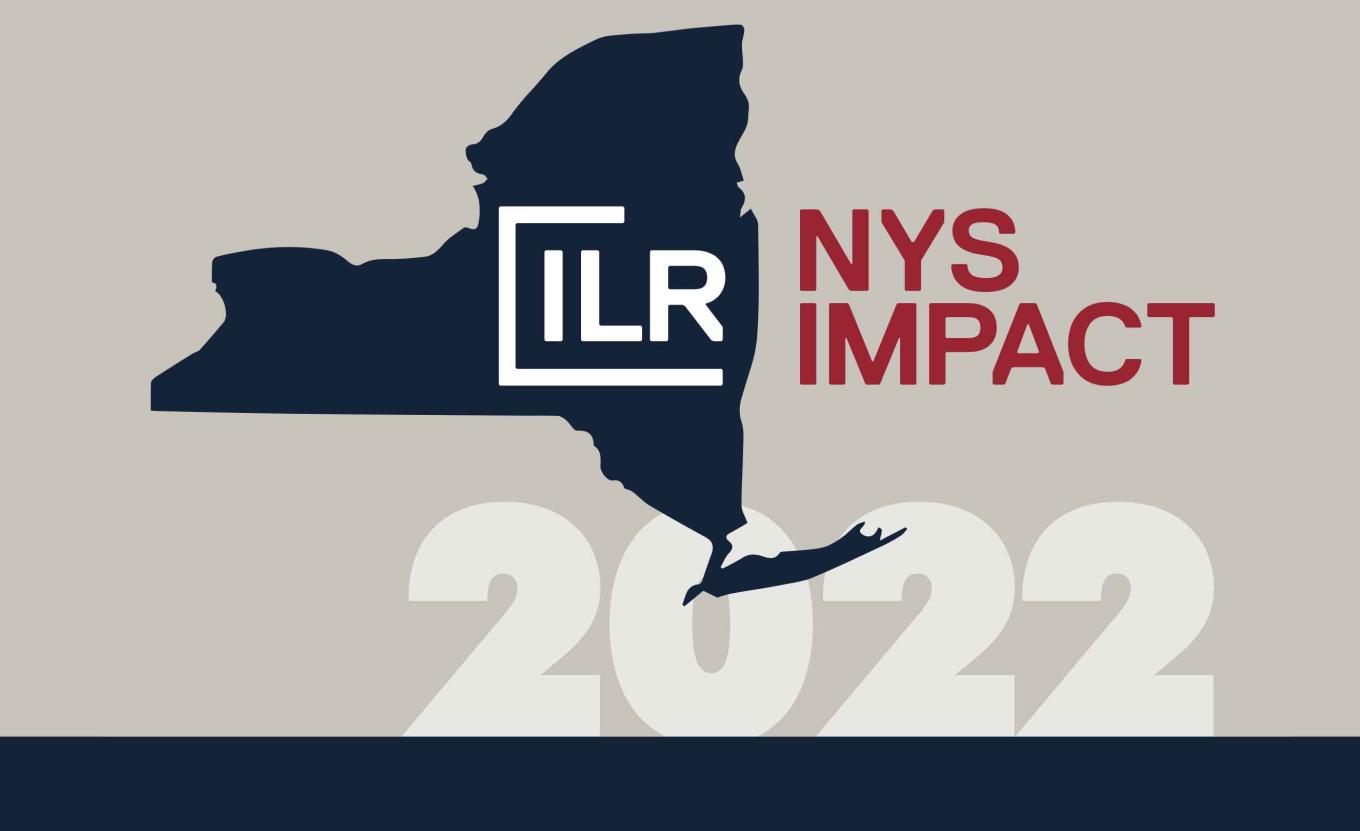
Welcome
We are thrilled to release the second annual New York at Work report from Cornell University’s New York State School of Industrial and Labor Relations (ILR). The report draws on ILR expertise, research-based data and policy analysis on a broad range of key issues affecting the state’s workers, unions, communities and employers. The report is intended to serve as an informative, accessible and relevant resource for New York’s policymakers and others. We hope that you find it useful and look forward to engaging with you to advance the important work that you do related to work, employment and labor.
For further assistance, please see the list of ILR Outreach institutes and programs with contact information at the end of the report.
Established by the New York State Legislature in 1945, the ILR School is guided by a commitment to social and economic justice and to improving the lives of New York’s working people. Consistent with our mission and to honor New York’s workers, the New York at Work report is published annually around Labor Day.
Sincerely,
Alexander J.S. Colvin, PhD '99
Kenneth F. Kahn ’69 Dean
Martin F. Scheinman ’75, MS ’76 Professor
Ariel Avgar, PhD '08
Professor, ILR Labor Relations, Law, and History Department
Senior Associate Dean for Outreach and Sponsored Research
Table of Contents
Buffalo Co-Lab
Criminal Justice and Employment Initiative
Labor and Employment Law Program
Labor Leading on Climate
The Worker Institute
Yang-Tan Institute on Employment and Disability
- Reimagining Learning and Development of Employment Professionals
- Improving Career Pathways for Justice-Involved Youth with Disabilities
About the New York State ILR School
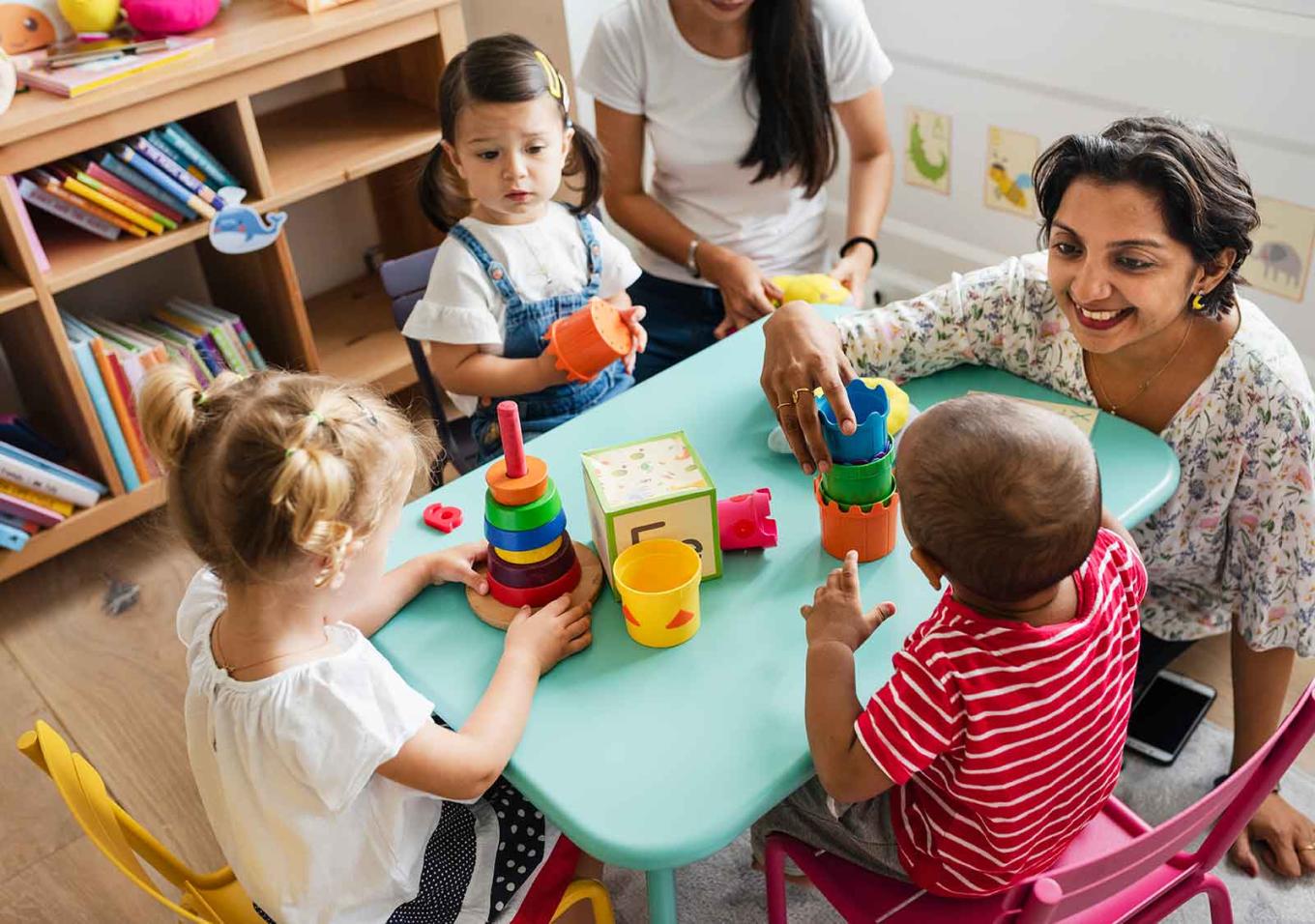
The True Cost of Child Care
Cathy Creighton, director; Russell Weaver, research director; and Lou Jean Fleron, political economy consultant, all of the ILR Buffalo Co-Lab.
Overview
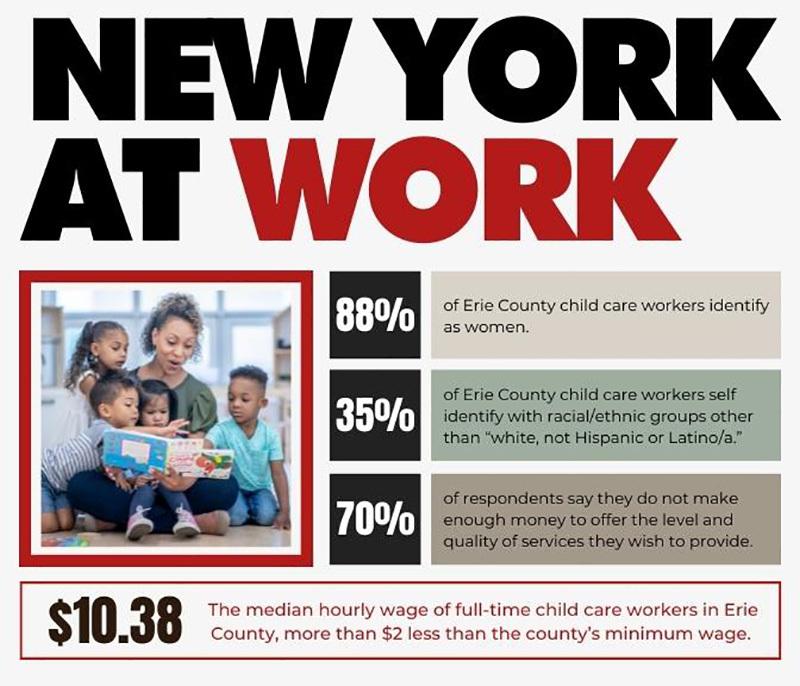
The Cornell University ILR Buffalo Co-Lab has been researching the Western New York child care industry since the mid-2000s. During the pandemic, a national child care availability crisis erupted. To acquire evidence to seek increased state child care funding, the Co-Lab was approached by New York Assembly Members Monica Wallace and Karen McMahon, and Erie County, to research and prepare a study identifying and quantifying gaps in the system: gaps between actual operating costs and state subsidy support; gaps between current and living wages for child care workers; and equity gaps in access, affordability and sustainability.
Research was conducted with a steering committee of state and local government officials, child care providers, child care advocates, community foundations and the child care resources network. Our January 2022 report, “The True Cost of Child Care,” included research findings of concern not just to child care workers and parents, but to New York’s economy as a whole.
Key Findings
- Eleven percent child care workforce loss 2019 to 2020 was due to low wages.
- Average annual wages for full-time child care workers is just over $23,000, with median hourly wage of $10.38.
- Child care workers are almost all women, and disproportionately people of color.
- Two-thirds of providers who accept public child care subsidies say existing subsidy rates do not cover their current costs of care; providers who educate financially disempowered children are more likely to be financially disempowered themselves.
- Seven of 10 survey respondents say they do not make enough money to offer the level and quality of services they wish to provide. Over 80% of subsidized providers report inadequate revenue.
Recommendations
- Provide increases in wages to the child care workforce
- Increase the number of families eligible for child care subsidies
- Explore universal child care models
Impact of Research
The child care study was used by Assembly Members Monica Wallace and Karen McMahon, Erie County, the New York State Association of Counties and the New York State Child Care Coalition to advocate for additional funding for child care in the FY 2023 NY Budget. The budget reached in April 2022 provided an historic $7 billion in child care funding. Impacts include:
- subsidy increase from the 69th to the 80th percentile of the market rate
- expanded eligibility for subsidies up from 200% to 300% of the federal poverty level
- increased capital funding for providers
- stabilization grant funding aimed especially at increased wages
- increase in universal pre-K funding
- increase in Facilitated Enrollment Program funding
- cap on family co-pays to 10% of income above the federal poverty level
- funding for child care centers on SUNY campuses
Relevant Information
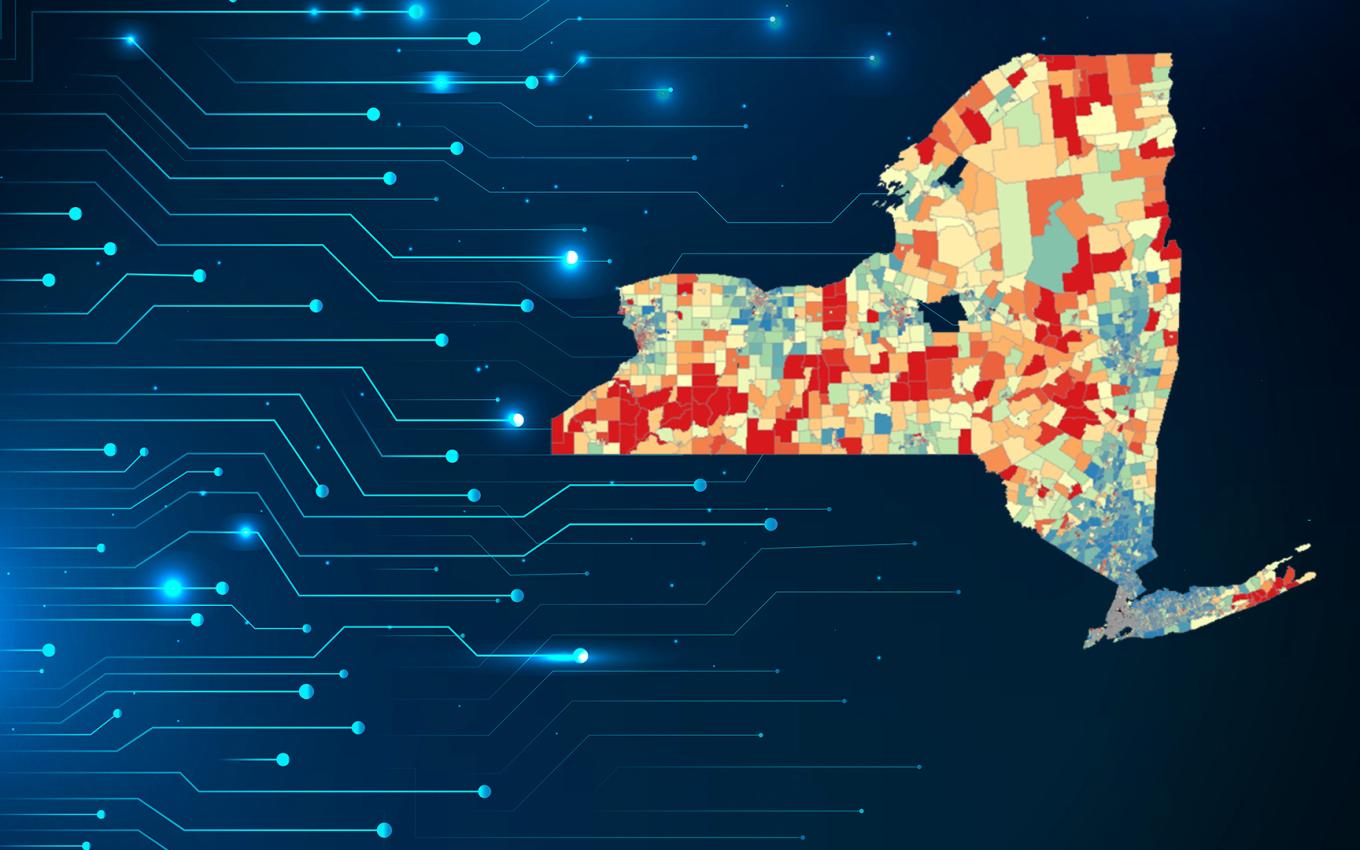
Buffalo Co-Lab Builds First NYS Broadband Inequities Map
Russell Weaver, director of research, Buffalo Co-Lab
Overview
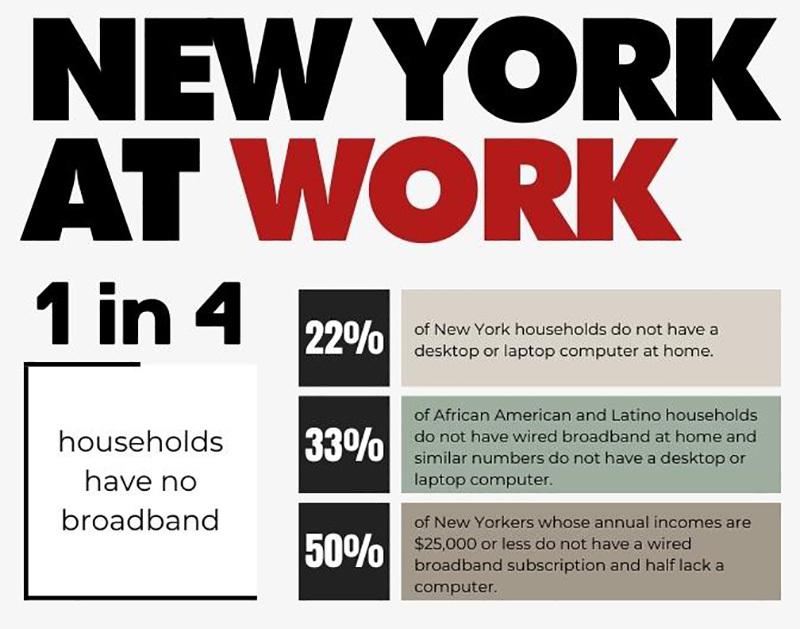
One thing we all learned from the pandemic is the importance of a cheap and reliable internet connection for work, school, health care and emergencies. Yet, many New Yorkers do not have broadband, and certainly not affordable and reliable broadband.
Working with the New York State Department of Education, the New York State Library, the John R. Oishei Foundation and Community Tech NY, Cornell ILR’s Buffalo Co-Lab built the state’s first interactive mapping portal tool for communities and individuals seeking data to inform broadband adoption and improve digital equity for millions of New York state residents without wired internet access.
Cornell ILR Buffalo Co-Lab Research Director Russell Weaver designed and built the interactive NYS Digital Equity Portal to help community leaders understand the scope of the digital divide and to guide decision-making such as where resources should be directed in light of the federal Infrastructure Investment and Jobs Act. The act includes spending $65 billion to help provide reliable, high-speed and affordable broadband across the nation.
The portal generates snapshots of connectivity, population/demographics, speed and cost of broadband, and analyzes data based on congressional districts, ZIP codes, U.S. Census tracts and the New York State Library system.
Key Findings
- Nearly 27% of New York households do not subscribe to wired broadband service at home.
- 22% of New York households do not have a desktop or laptop computer at home.
- Half of New Yorkers whose annual incomes are $25,000 or less do not have a wired broadband subscription and half lack a computer.
- One-third of African American and Latino households do not have wired broad band at home and similar numbers do not have a desktop or laptop computer.
- The NYS Digital Equity Portal is a groundbreaking step to advance digital equity by supporting community leaders’ understanding of the scope of the digital divide.
- The NYS Digital Equity Portal reveals access barriers and will help communities develop digital equity strategies based on an understanding of digital equity needs, gaps and priorities.
- The portal provides policymakers information to advance digital access for all New Yorkers.
Impact of Research
The mapping tool has been downloaded more than 4,600 times to assist communities across the state in advancing digital equality. The map confirms what many have believed anecdotally: that low-income New Yorkers living in urban and rural areas, and people of color, lag on internet technology.
Relevant Information
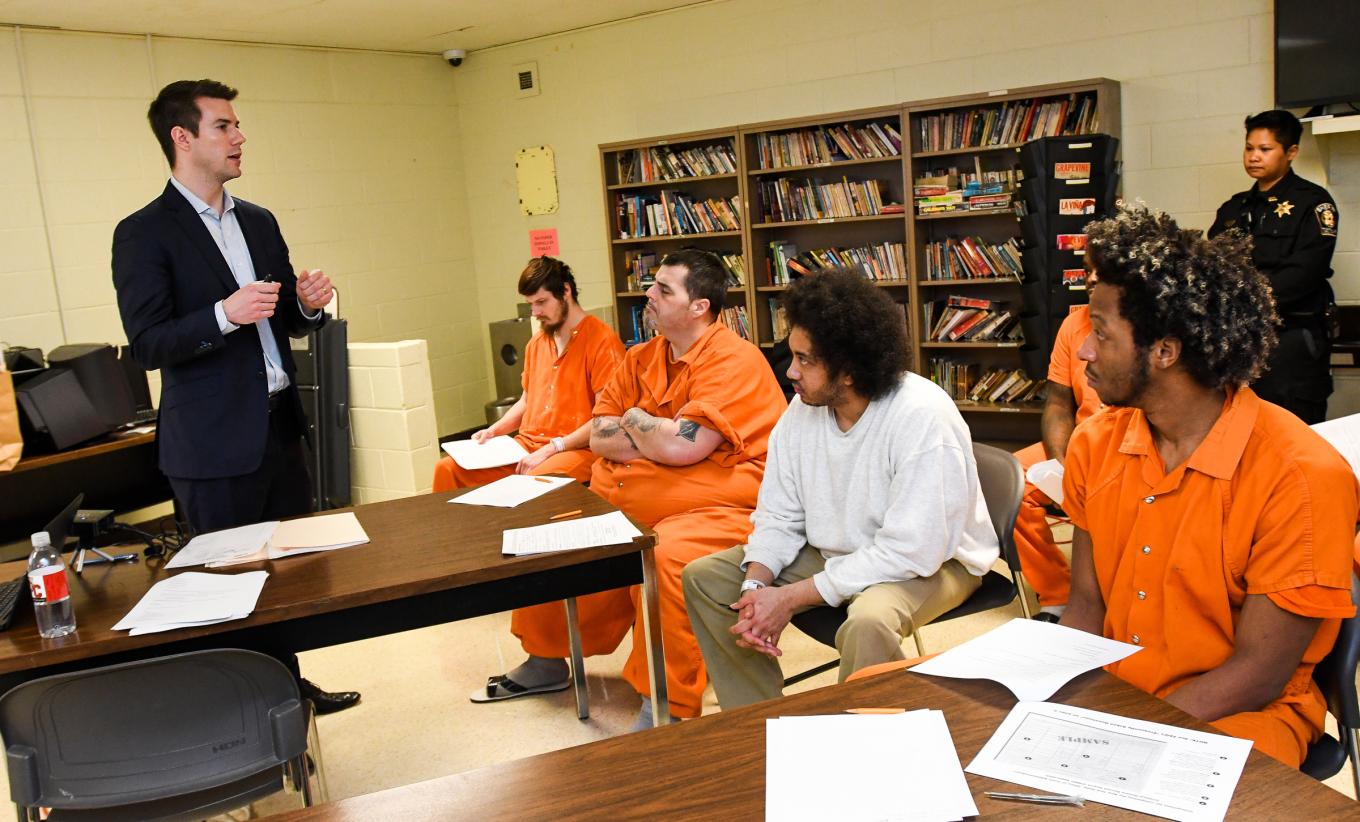
Beyond the Pledge: Getting New Yorkers with Criminal Records Back to Work
Overview
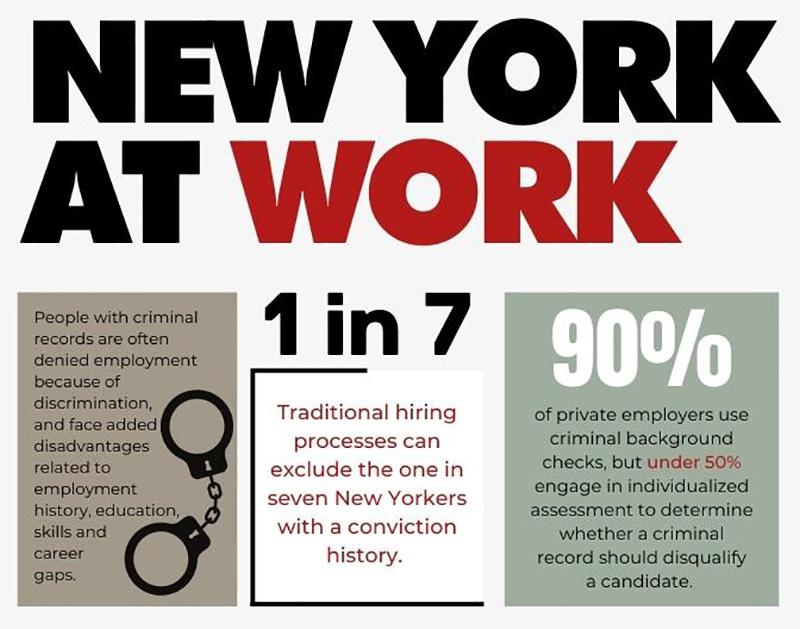
As New York state faces a labor shortage, employers are looking to expand talent pools and diversity, equity and inclusion. However, traditional hiring processes can exclude the one in seven New Yorkers with a conviction history. That’s more than two million people, and has major ramifications for the labor market. Ninety percent of private employers use criminal background checks, but less than half engage in individualized assessment to determine whether a criminal record should disqualify a candidate.
People with criminal records are often denied employment because of discrimination, and face added disadvantages related to employment history, education, skills and career capital gaps. To go “beyond the pledge” in fair chance hiring, and in collaboration with state workforce development systems, private employers and job seekers need new tools to look beyond traditional résumés, cover letters and background reports that narrow talent pools.
Key Findings
- Current hiring methods shrink talent pools by relying on online applications, traditional résumés, cover letters, third-party criminal record background checks and human resource management software codes that filter out nontraditional candidates.
- The current criminal background screening process is conducted with little attention to detail and minimal checks, and it fails to account for inequities in the criminal legal system. Third-party criminal background checks are potentially dehumanizing and do not create a complete profile of someone looking for a job, despite multiple studies showing that people with criminal records represent a potential qualified, loyal and untapped talent pool.
- Positive indicators of community adjustment, self-efficacy, and self-determination seldom make their way into human resource assessments related to background checks. Indicators include leisure and hobby pursuits; job skills development and training; community engagement experiences; supplemental education/skills training and micro-credentials; pursuit of mentorship and counseling.
- Although gainful employment and community rehabilitation are closely linked, little research has explored the overlap between restorative factors and measures of employment success. However, common measures of employability focus on skills such as conflict resolution, problem solving skills, reliability, communication, teamwork and willingness to learn, all of which overlap with the restorative factors listed above.
Recommendations
- Develop a suite of micro-credentialing offerings for justice-impacted job seekers to pursue and document goal-directed representations of their skills, competencies and personal characteristics that are tailored to specific employment sectors and facilitate the development of “digital career capital,” both for job seekers with criminal records and for employers.
- Provide employers with legitimate alternatives to the use of criminal records as a screening device for employment by equipping them with alternative models, tools and cultural competencies for assessing candidates with criminal records and supplement existing human resources practices to remove arbitrary talent pool filters and promote nontraditional hiring.
- Connect justice-impacted individuals to a unified ecosystem with upskilling programs, fair chance employers and wraparound services that support people throughout their employment journeys.
Impact of Research
- The Criminal Justice and Employment Initiative’s “Restorative Record” Project helps businesses strengthen their workforces and make recruitment processes more accessible.
- The project addresses criminal record discrimination by working with employer partners to develop talent acquisition reform initiatives and by developing customized, sector- and employer-specific tools that serve as alternatives to criminal background checks. These tools supplement risk-based human resource assessments with positive indicators of community adjustment, self-efficacy, self-determination and “micro-credentials.”
- As New York continues to dramatically reduce its incarcerated populations, the goal of “Restorative Record” is to work directly with employers interested in fair chance hiring to go “beyond the pledge,” meeting essential talent needs while ushering in a new era where criminal records are not an automatic barrier to work.
Related Information

Cannabis Workforce Initiative: Needs Assessment Survey
Esta R. Bigler, director, Labor & Employment Law Program, and ILR School student Julia Risi ’23
Overview
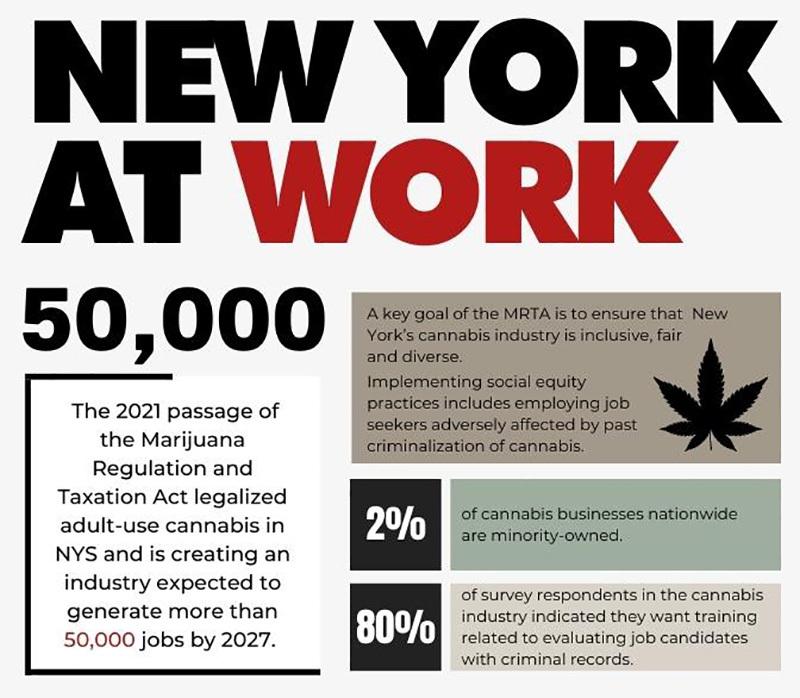
The 2021 passage of the Marijuana Regulation and Taxation Act legalized adult-use cannabis in New York state and is creating an industry expected to generate more than 50,000 jobs by 2027. A key goal of the act is to ensure that New York’s cannabis industry is inclusive, fair and diverse, a challenge in an industry that in other states is overwhelmingly owned and/or run by white men. Providing resources and training to the communities and individuals harmed by mass incarceration due to the criminalization of cannabis will offer opportunities to build generational wealth through cannabis businesses.
To determine the workforce needs and inform development of an inclusive industry, the Cannabis Workforce Initiative, a partnership of Cornell ILR and the Workforce Development Institute, launched a national survey. Responses from 112 entities from 50 states and Canada included the respondent’s role within the industry, job titles needed, skills for workers, training needs and roadblocks for achieving social equity in the cannabis market.
Key Findings
- Business owners are seeking employees for positions ranging from budtender/cannabis sales, inventory and dispensary managers, growers, couriers/delivery staff, and harvesters/cultivators to edibles chefs and packagers, technicians for extraction, laboratories and irrigation, which shows the need for extensive and varied workforce training and development programs.
- Respondents indicated that workers require a wide variety of soft skills, such as customer service, professionalism, leadership, reliability and trustworthiness, as well as an understanding of the law and regulations.
- Implementing social equity practices includes employing justice-involved job seekers adversely affected by past criminalization of cannabis. While employers said they are willing to hire these individuals, over 65% of them indicated they do not have enough information about reviewing, interpreting and evaluating criminal background checks.
- Barriers for achieving a diverse workforce include job seekers’ lack of awareness about career opportunities (27.1%) and lack of necessary skills and education among job candidates (26.6%). These two factors significantly limit hiring that aligns with the act’s social equity goals.
Recommendations
- Pre-apprenticeship/apprenticeship models should be used to provide “earn while you learn” employment and training. These programs utilize people in the industry to mentor with hands-on training, supplemented by “classroom” instruction, to build a well-trained, skilled workforce and provide good paying jobs for underserved communities. Corresponding programs for employers and social equity entrepreneurs will help build successful workplaces.
- The Office of Cannabis Management needs to develop a comprehensive social equity framework to guide licensees that includes metrics capable of measuring diversity and equity in employment. The office should audit reports submitted annually by employers that report data on hiring, promotions, retention, salaries, job training and other areas. Meeting social equity goals will be part of the criteria for the determination of license renewal.
- Nearly 80% of respondents stated that they want training and resources related to evaluating job candidates with a criminal record. Employers need training and resources to ensure that justice-involved applicants are fairly evaluated and hired on their merits.
- To ensure that the act’s social equity goals are met, there must be regular evaluation to verify that affected communities, people of color, minority and women-owned business enterprises, distressed farmers and service-disabled veterans are targeted for recruitment and training. The Office of Cannabis Management should also provide support and assistance in the minority and women-owned business enterprises application process and in seeking social equity licenses to ensure long-term success.
Impact of Research
Providing training, resources and communication to existing employers, social equity entrepreneurs and workers will increase the likelihood of long-term success and of building generational wealth. Monitoring and accountability systems for meeting social equity goals, along with supports, are essential to ensure that the state succeeds in establishing social equity in the cannabis industry despite failures in other states.
Related Information
Tackling Climate Change, Reversing Inequality, and Building a Diverse, Inclusive Clean Energy Workforce
Cornell Labor Leading on Climate program: Lara Skinner, director; Zach Cunningham, Avalon Hoek Spaans and Anita Raman, ILR Extension faculty, Melissa Shetler, contributing author and workforce development specialist; Midori Valdivia, contributing author and transportation specialist.
Overview
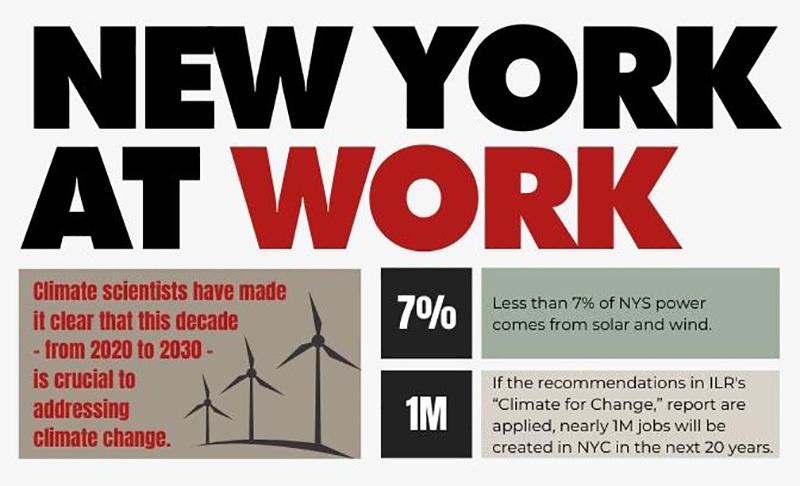
Climate change is an environmental catastrophe and one of the most important social, racial, and economic justice issues of our time. Storms such as Hurricane Ida have shown that every New Yorker will feel the impacts of climate change. However, vulnerable groups – frontline and low-wage workers, communities of color, the elderly and others – will suffer most. As the state with the highest income inequality in the country, it is imperative that New York’s climate protection policies also embody strategies to decrease inequalities. Climate scientists have made it clear that this decade – from 2020 to 2030 – is crucial to addressing climate change. Yet, before the pandemic, New York’s emissions continued to rise. And while New York has made bold commitments to address climate change and expand renewable energy production, less than 7% of the state’s power comes from solar and wind.
In May 2022, Cornell ILR’s Labor Leading on Climate program released a new report, “Climate for Change: A Complete Climate Jobs Roadmap for New York City.” This report presents a series of recommendations that can strengthen New York’s economy, tackle climate change at scale, and address racial and economic inequality through the creation of high-quality union jobs targeted at those who need them most.
Key Findings
- New York City is on the front lines of the climate crisis. Record-shattering extreme weather events and worsening worker conditions show that climate change is already here.
- New York City’s climate goals are not ambitious enough. Emissions have been increasing – with the exception of the pandemic – and without significant vision and investment in new and updated infrastructure the city will not meet its decarbonization goals.
- Climate work is not happening at scale. The city allocated only 1.4% of its capital budget to energy efficiency and greenhouse gas emissions reductions in 2022, and only $10 million in green job training programs in 2021.
- Major job opportunities exist if we do climate work at scale, and they span nearly every economic sector. If the recommendations in this report are implemented, they will create nearly one million jobs over the next 20 years.
- New jobs in the clean energy economy need to be family-sustaining, long-term careers. The New York State Legislature recently added labor standards to renewable energy projects of one megawatt or larger. Labor standards should also be applied to residential and commercial solar installations.
Recommendations
- Transform all K-12 public schools, housing, and health and hospital buildings to be carbon-free and healthy by 2030.
- Invest in local offshore wind development and begin developing plans for green hydrogen production at ports and substations.
- Require a public buildout of 50,000 electric vehicle chargers and mandate an Electric Vehicle Installation Training Program certification for charger installations.
- Expand funding for direct-entry pre-apprenticeship training programs, including additional funding for stipends, child care vouchers and transportation assistance to bolster participation from front-line and historically marginalized communities.
Impact of Research
As the 10th largest economy in the world, and a city with one of the largest carbon footprints, New York City has a critical role to play in leading the fight against climate change and for a diverse, inclusive clean energy economy that lifts all New Yorkers. These “climate jobs” recommendations show how New York City can play this role; the recommendations were developed in a collaborative process with 70 leaders from the local labor and environmental movements, policymakers and experts in the climate, energy and labor fields. Cornell also provides training and education to union members and other allies on the climate crisis and on key opportunities in the clean energy economy.
Related Information

Bearing the Brunt of Economic Inequality: The Experience of Low-Wage, Precarious Workers in the Nail Salon Industry in New York
Zoë West, independent researcher; Russell Weaver, research director, ILR Buffalo Co-Lab; KC Wagner, director, Equity at Work, ILR Worker Institute
Overview
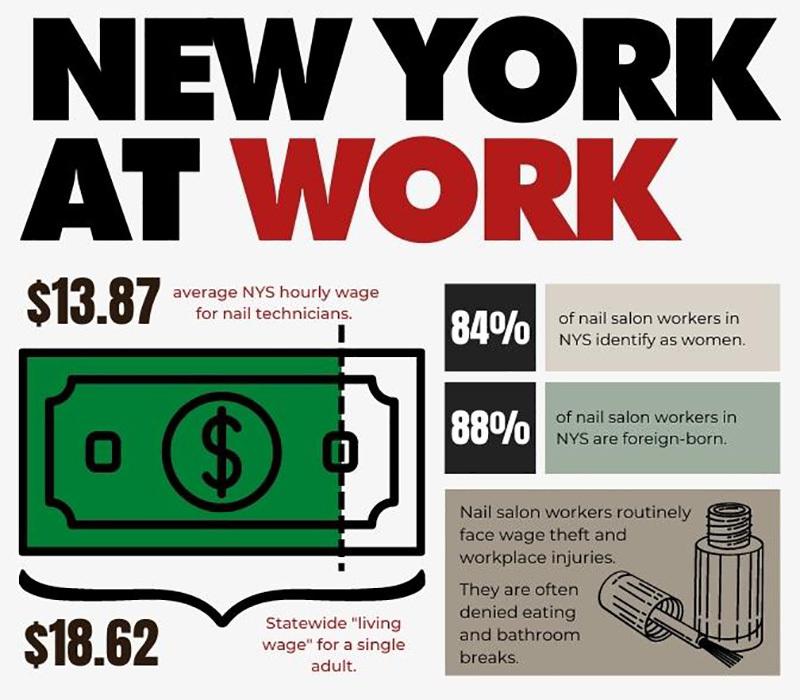
On the surface, the New York state labor market has gained important ground since the darkest hours of the pandemic. Unemployment is at 4.4% as of July 2022, and wage growth is up, though threatened by emerging economic changes.
And yet, beneath the surface, the outlook is less sanguine for workers in low-wage and precarious employment. Importantly, as sources of economic inequality, low-wage and precarious work intersect with long-standing occupational segregation, discrimination and other labor market disparities. The result causes women, Black, Hispanic and other immigrant workers to be more likely to hold low-wage, precarious jobs. In the immediate, this affects individuals’ ability to cover basic household expenses. Over time, this impacts individuals’ and families’ human well-being, and stymies social and economic mobility.
Unvarnished: Precarity and Poor Working Conditions for Nail Salon Workers in New York State is an ILR Worker Institute report that elucidates these sources of economic inequality in New York state’s nail salon industry.
Bearing the Brunt of Economic Inequality: The Experience of Low-Wage, Precarious Workers in the Nail Salon Industry in New York State
Key Findings
- In New York state, nail salon workers routinely face violations of fundamental workplace laws, such as wage theft. Also, most workers are paid less than minimum wage; net hourly pay is $13.87.
- Workers lack the ability to take breaks to eat or use the bathroom.
- There is little to no workplace safety; workplace injuries are common.
- Workers lack basic social protections that provide support for unemployment, health care, family leave, paid sick leave, disability and retirement.
Recommendations
- Although the 2015 Bill of Rights for Nail Salon workers created important labor protections, research found that nail salon employers do not fully comply with existing laws and regulations, as wage theft and health and safety violations persist. Stronger and more targeted enforcement mechanisms are needed to bring more nail salon businesses into compliance with new and existing laws and regulations.
- Agencies charged with enforcement are severely understaffed and underfunded, creating significant limitations in addressing high levels of wage, hour and health and safety violations. Increased staffing and resources are needed to monitor workplace violations.
- The complaint-based nature of enforcement, where the burden falls on workers to initiate claims, has also proven wholly inadequate for vulnerable workers in low-wage sectors. Alternative mechanisms for complaints are needed.
- Policies are needed to ensure all workers have recourse to social protections irrespective of their worker classification as self-employed or “independent contractors.” This includes access to health insurance and paid sick and parental leave.
Impact of Research
Employment is the principle route for individuals and families to escape or avoid poverty, and for societies to return to lower levels of economic inequality. If we are serious about addressing the historically high levels of economic inequality that are rampant in the United States, an important place to start is in addressing the need for social and labor protections for every worker – especially workers engaged in low-wage, precarious employment – as essential mechanisms to redistribute capital and power in order to reduce poverty and economic inequality.
In the study referenced here, nail salon workers, who are disproportionately Asian and Latino immigrants, barely make enough to survive, let alone thrive. This has the effect of undermining social cohesion and democratic norms. But none of this is inevitable. Crucial legislative action is needed to reverse course.
Related Information
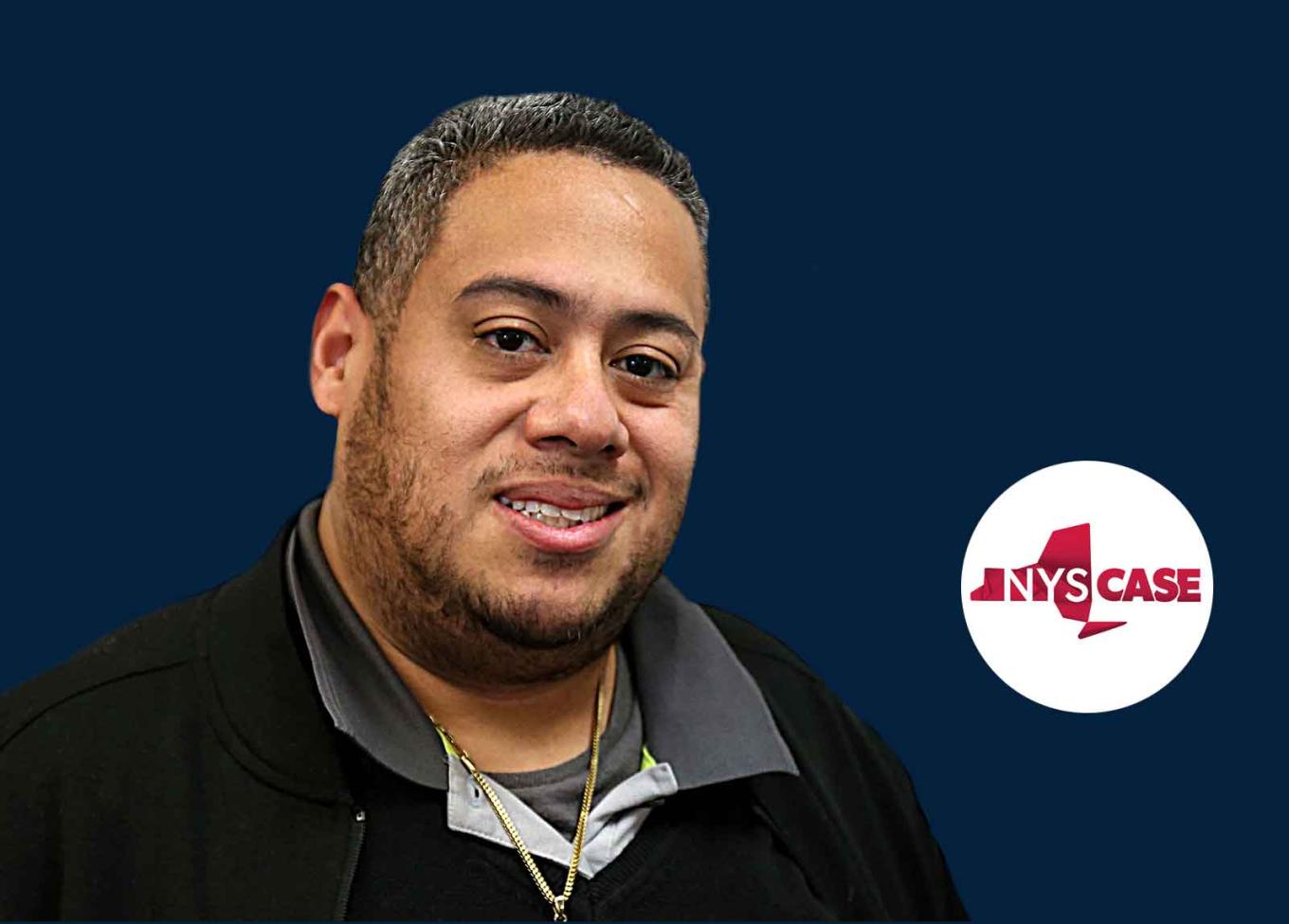
Reimagining Learning and Development of Employment Professionals
Andrew J. Karhan, Thomas P. Golden Director, Disability Workforce Development and Policy and Legislative Initiatives, Yang-Tan Institute on Employment and Disability
Overview
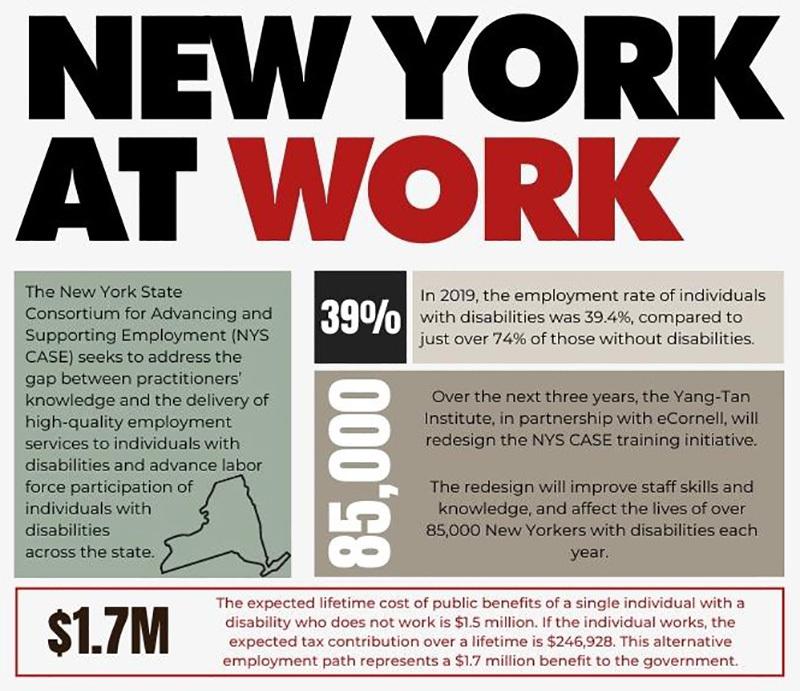
The New York State Consortium for Advancing and Supporting Employment, known as NYS CASE, seeks to address the gap between practitioners’ knowledge and the delivery of high-quality employment services to individuals with disabilities and advance labor force participation of individuals with disabilities across the state. NYS CASE annually provides an average of 225-plus live trainings to nearly 2,700 practitioners representing 300 organizations in New York state that provide services, such as supported employment, benefits advisement, pre-employment transition services and direct placement services.
While the impact of reaching this group of practitioners is vast, the Cornell team embarked on two initiatives to advance these efforts through research.
First, we developed an intervention to explore the career aspirations of employment support professionals attending NYS CASE trainings. The intervention consisted of strategically placed motivational messages about career planning to determine if the messages would influence behavior of attendees’ involvement over time.
Second, we embarked on research related to learning strategies to improve the impact of professional development initiatives. This work explored the use of effective learning strategies in an asynchronous/synchronous blended learning environment, with the goal of adding flexibility to the structure while enhancing the likelihood of knowledge acquisition and application by learners.
Key Findings
- Research indicated limited effect of the career aspiration intervention on course completion, but the study yielded important considerations to increase the effectiveness and impact of NYS CASE.
- The motivation study provided a final catalyst for the Yang-Tan Institute to propose a complete redesign of NYS CASE to our New York state partner.
- Research on learning strategies, myths regarding learning styles, and understanding the benefits of in-person, online and other learning environments have informed the redesign.
Recommendations
While the motivation study produced limited evidence of the intervention increasing course and training-tier completion over the two-year study period, it led to key recommendations to advance the program:
- introduce flexibility into the program through asynchronous modules
- allow learners to develop individualized learning plans
- increase supervisor buy-in for the process.
Impact of Research
The findings, as well as the institute’s exploration into the research of learning theory and knowledge acquisition, led to a proposal to Adult Career and Continuing Education Services-Vocational Rehabilitation, part of the New York State Education Department. The proposal is to reimagine and redesign the CASE curriculum to incorporate research-based learning strategies in the context of a blended learning platform including synchronous and asynchronous learning.
In partnership with eCornell, the institute will redesign the NYS CASE training initiative during the next three years. The redesign will ensure knowledge attained through the curriculum is applied, increasing the flexibility of the learning experience and increasing buy-in from supervisors, who need flexible options to develop their respective teams.
This new frontier for NYS CASE will improve staff skills and knowledge, and affect the lives of over 85,000 New Yorkers with disabilities each year.
Related Information
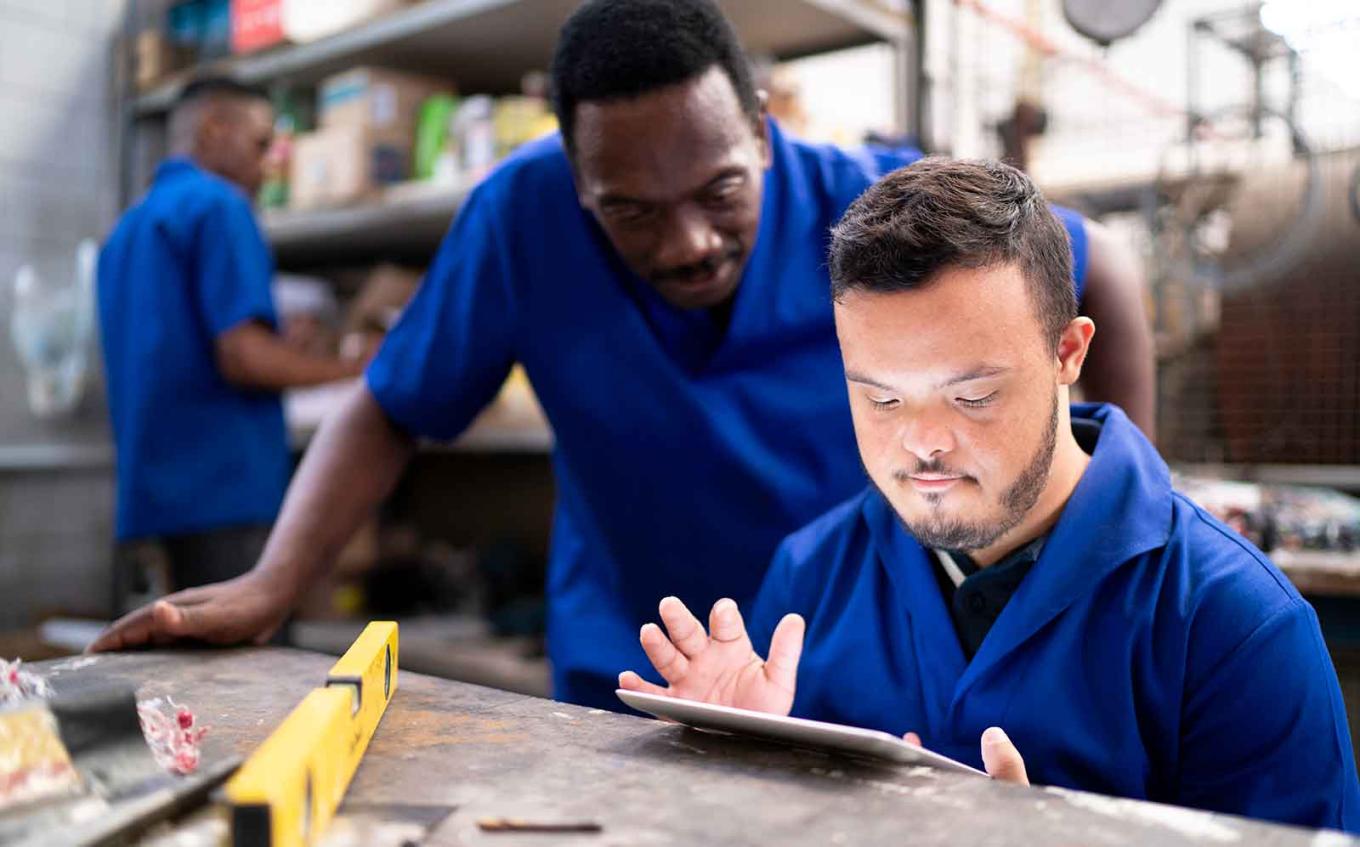
Improving Career Pathways for Justice-Involved Youth with Disabilities
Matthew Saleh, senior research associate, and LaWanda Cook, senior Extension associate, both of the Yang-Tan Institute on Employment and Disability
Overview
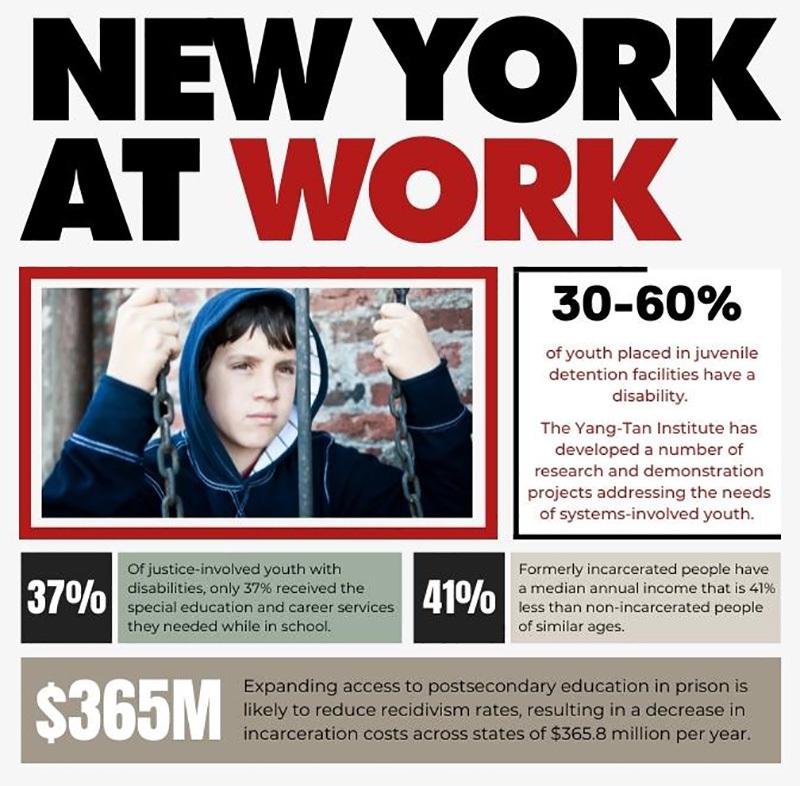
As the state continues to reduce incarcerated populations, a rapidly growing number of justice-impacted people will reenter society with barriers to work, education, training and financial security. Youth and young adults with disabilities are dramatically overrepresented in justice involvement and have lower employment, educational and community integration outcomes upon reentry, representing a disproportionate share of the state’s unemployed population.
Serving Justice-Involved Youth with Disabilities focuses on systems-level interventions that increase trauma-informed, person-centered, culturally competent vocational rehabilitation outreach and work-based service coordination for justice-impacted youth and young adults with disabilities, who face education and employment disruptions as they transition to adulthood.
Key Findings
- Interagency collaboration and coordination between justice agencies and systems, such as vocational rehabilitation, workforce development, mental health and developmental disabilities, occurs less frequently than needed and there is no agreed upon framework across systems.
- There is need and opportunity for youth-serving agencies with different objectives and outcomes measures to work toward the central objective of increasing access to good, stable employment opportunities for justice-involved youth and young adults. This can be obtained by developing formal structures for coordinating work-based services and supports.
- Increasing connections between state and local agencies also provides opportunities to develop cultural competencies in serving justice-involved youth and young adults. With the objective of increasing equity and career development for an alienated segment of the labor force, local workforce development efforts can connect employers faced with labor shortages to youth and young adults exploring career pathways through structured work-based learning opportunities.
Recommendations
- Emphasize local workforce development collaborations specifically targeting justice-involved youth and young adults, as well as employers, local chambers of commerce, community service providers, diversion programs, and other key stakeholders.
- Move beyond generalized training to ensure that disability-focused, culturally competent, person-centered services are happening across agency silos. This means providing disability-specific training to justice systems professionals, and providing justice-impact training for workforce and disability systems, as well as helping these systems to move away from paternalistic or one-size-fits-all approaches.
- Facilitate training efforts through formal interagency agreements, shared professional positions in the courts and mental health offices, and agency needs assessments.
Impact of Research
The Yang-Tan Institute has developed a number of research and demonstration projects addressing the needs of systems-involved youth. These include Pro Se Speech and Debate, the Youth Reentering the Community through Opportunity, Networking, Navigation, Education, Collaboration and Transition support, and Juvenile Justice Reentry Community of Practice and the Systems-Involved Youth Vocational Rehabilitation project.
In the first cohort of “Pro Se: Empowering Justice-Involved Youth, seven Cornell undergraduate mentors worked with 17 youths in Utica, New York.”
Through the Youth Reentering the Community through Opportunity, Networking, Navigation, Education, Collaboration and Transition project a group of “reentry ambassadors” work to support professionals, as well as the youth and family members who are “experts by experience,” as they implement recommended practices locally
To date, more than 300 stakeholders have been impacted by the training and technical assistance offered, and teams have initiated efforts, such as development of user-friendly resource maps to help youth and families identify needed resources, and revised practices to reduce barriers to accessing services.
Related Information
About the New York State ILR School
Established by the New York State Legislature in 1945, the New York State School of Industrial and Labor Relations at Cornell University is the world’s leading college of the applied social sciences focusing on work, labor and employment. It is guided by a commitment to social and economic justice and to improving the lives of New York’s working people.
With offices in New York City, Buffalo, and Ithaca, Cornell ILR Outreach provides research, reports, education and training for New York’s workers, unions, employers and government. It serves as a valuable resource for New York’s policymakers to advance equitable workplaces and well-informed public policy.
Key ILR Institutes and Programs Impacting New York State:
CONTACT:
Cathy Creighton
Director
cathycreighton@cornell.edu
The Cornell ILR Buffalo Co-Lab for Economic Development continues to play a leading role in Buffalo’s resurgence with a more equitable economy. By partnering with western New York businesses, unions, government, education and community organizations, the Buffalo Co-Lab impacts New Yorkers statewide through workplace health and safety programs, economic development and labor research, immersion experiences for students and many other initiatives.
CONTACT:
Timothy McNutt
Director
tmcnutt@cornell.edu
The Criminal Justice and Employment Initiative improves employment opportunities for people with criminal records by designing and delivering legal employment training to close information gaps, implement best practices, and integrate job seekers with criminal records into the workforce.
CONTACT:
Ian Greer
Director
icg2@cornell.edu
The ILR Ithaca Co-Lab officially began its work in early 2020. Researchers and students who serve community partners use resources to tackle the challenges of fighting unemployment, winning a living wage and organizing for worker voice in Ithaca and the surrounding region.
CONTACT:
Esta Bigler
Director
erb4@cornell.edu
The Labor and Employment Law Program merges law and social science research to provide attorneys, legislators, social scientists and policymakers with multifaceted perspectives at forums and conferences. Current and emerging legal issues affecting the workplace are analyzed with the goal of influencing research, legislation, policy and litigation.
The program’s New York State Cannabis Workforce Initiative is a collaboration between ILR and the Workforce Development Institute. Our mission is to promote and support social equity in the adult-use cannabis market by providing quality workforce development and legal education. Our work, supported by a state budget appropriation, prioritizes diversity, equity and quality jobs in the emerging cannabis industry through skills training, entrepreneurism services, workforce supports, legal education for employees and employers, and the development of high-road career pathways.
CONTACT:
Harry Katz
Director
harry.katz@cornell.edu
The Scheinman Institute combines the academic depth of faculty in conflict/dispute resolution, employee relations, diversity and inclusion, and labor relations with the practical knowledge of leading practitioners in the field to provide intensive skill development for individuals, and best practices for organizations.
The Institute trains more students in mediation and arbitration than any other school in the United States.
CONTACTS:
Anne Marie Brady
Research Director
Worker Rights and Equity
ab2532@cornell.edu
Patricia Campos-Medina
Executive Director
The Worker Institute
pec1@cornell.edu
Risa Lieberwitz
Academic Director
The Worker Institute
rll5@cornell.edu
Lara Skinner
Director
Labor Leading on Climate
lrs95@cornell.edu
KC Wagner
Director of Workplace Issues,
Sexual Harassment and Gender-Based Violence in the Workplace
kcw8@cornell.edu
The Worker Institute focuses on reversing inequality to build a more just and democratic society. It engages in research and education on contemporary labor issues that generate innovative thinking and solutions to problems related to work, the economy and society.
These programs and activities are part of The Worker Institute:
- New York State AFL-CIO/Cornell Union Leadership Institute
- The Workplace Sexual Harassment/Gender-based Violence Awareness Program
- Labor Leading on Climate Initiative: Climate Jobs in New York State
- Gig workers: Tackling policy issues and exploring solutions
CONTACTS:
Susanne Bruyère
Academic Director
smb23@cornell.edu
Sarah Von Schrader
Research and Program Evaluation Director
sv282@cornell.edu
Andrew Karhan
Thomas P. Golden Director
Disability Workforce Development and New York State Policy and Legislative Initiatives
andrew.karhan@cornell.edu
Wendy Strobel Gower
Thomas P. Golden Director
Disability-Inclusive Workplaces and Employer Fee-for-Service Initiatives Director, Northeast ADA Center
ws283@cornell.edu
The Yang-Tan Institute on Employment and Disability advances equal opportunities for people with disabilities in partnership with federal and state government and philanthropic organizations. It impacts thousands of people each year through research and services to employers, labor unions, government agencies, educational institutions, community service providers, disability advocacy organizations, policymakers, the media, students and adults with disabilities and their families.